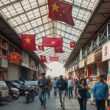Germany is launching a new Raw Materials Fund, spearheaded by Economics Minister Katarina Reiche (CDU), in a move explicitly aimed at diminishing the nation’s reliance on Chinese imports, particularly in critical minerals. The fund, slated to reach a total volume of €1 billion by 2029, represents a significant, albeit potentially problematic, shift in Berlin’s industrial strategy.
Initial investments, totaling up to €150 million, are earmarked for lithium extraction in the Upper Rhine Valley, with private investors contributing an additional €1.9 billion. Further projects include ventures into copper and gold mining in Canada, with an investment cap of €150 million as part of a broader project valued at over €500 million and a €100 million stake in rare earth element extraction in Australia. Private capital commitments for these and subsequent projects are reportedly reaching €1.7 billion.
Reiche, in comments to “Bild”, characterized the fund as a proactive response to the “difficult situation with China” asserting the government’s ability to “leverage private capital”. This declaration, however, underscores a critical tension: while the stated goal is to reduce dependence on China, the reliance on private investment raises concerns about potential misalignment of national strategic interests with profit-driven motives.
Critics question the fund’s long-term effectiveness and transparency. The reliance on private investment may expose the government to pressure from stakeholders prioritizing short-term financial gains over the carefully calibrated and potentially slow, process of diversifying supply chains. Furthermore, the relatively small government contribution – one euro for every nine euros of private funding – raises questions about the level of sovereign control and influence over project direction and adherence to environmental and labor standards.
The fund’s success hinges on its ability to navigate complex geopolitical landscapes and compete with established Chinese dominance in the raw materials market. While presented as a sign of German assertiveness on the global stage, the Raw Materials Fund ultimately represents a calculated gamble and one that demands rigorous oversight and a clear articulation of strategic priorities to avoid unintended consequences.





